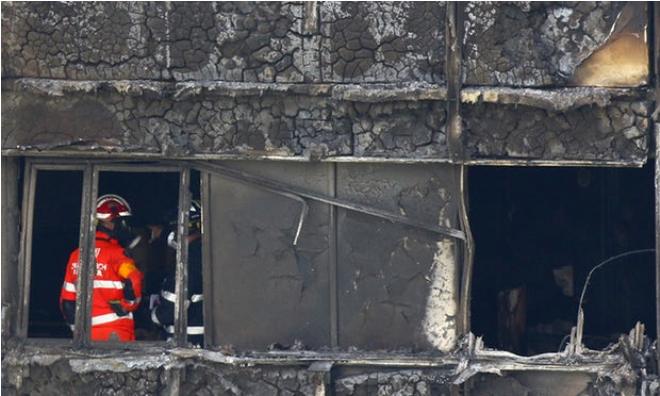
Friday June 16, 2017
Exclusive: Omnis Exteriors asked to supply cladding £2 cheaper a square metre than fire-resistant type, investigation finds

Material used in the cladding that covered the Grenfell Tower was the cheaper, more flammable version of the two available options, an investigation of the supply chain has confirmed.
Omnis Exteriors manufactured the aluminium composite material (ACM) used in the cladding, a company director, John Cowley, confirmed to the Guardian.
He also said Omnis had been asked to supply Reynobond PE cladding, which is £2 cheaper per square metre than the alternative Reynobond FR, which stands for “fire resistant” to the companies that worked on refurbishing Grenfell Tower.
“We supplied components for a system created by the design and build team on that project,” said Cowley.
Harley Facades confirmed it had installed the panels bought from Omnis in the work it performed on Grenfell Tower.
Omnis sold ACM cladding to Harley Facades, which was responsible for installing it.
Construction firm Rydon Maintenance was the lead contractor on the project but sub-contracted elements of the work to smaller companies, including Harley.
CEP is owned by Omnis Exteriors, which describes itself as a “leading UK manufacturer and supplier of exterior building products and systems”.
Its website states: “With almost 400 multi-storey projects completed, you know that you are in good hands.”
The website also says Omnis manufactures cladding at a workshop in St Helens and has supplied dozens of building projects around the country.
It reported a profit of £1.2m last year, the same year in which the ACM it supplied was installed on Grenfell Tower.
The company also paid a dividend of £950,000 to its sole shareholder, an investment group specialising in construction companies called Xerxes Equity.
The chairman of Xerxes and its largest shareholder is the corporate grandee Tony Rice, who is a former chief executive of the telecoms multinational Cable & Wireless and is also a trustee of the housing charity Shelter.
German construction companies have been banned from using plastic-filled cladding, such as Reynobond PE, on towers more than 22 metres high since the 1980s when regulations were brought in to improve fire safety at residential blocks.
Concerns that the panels could exacerbate the spread of fires led authorities to allow them only on buildings that can be reached by the fire brigade using fully-extended ladders from the ground. Taller buildings require panels with a more fire-resistant core and separate staircases for people to use if evacuation becomes necessary.
Frankfurt’s fire chief, Reinhard Ries, said he was appalled at the fire at Grenfell Tower and said tighter fire-safety rules for tower blocks in Germany meant that a similar incident could not happen there. US building codes also restrict the use of metal-composite panels without flame-retardant cores on buildings above 15 metres.
Germany is deemed to have some of the most stringent fire regulations in the world. High-rise tower blocks are common, particularly in former communist parts of the country, where they dominated new-build housing for decades.
In Berlin and elsewhere, the austere blocks have become fashionable places to live, in part because of a housing shortage and the high cost of accommodation.
Berlin’s fire chief, Wilfried Gräfling, said the London fire made it clear that fire regulations should be tightened further with only mineral materials used in cladding panels. “We will try to persuade lawmakers that flammable material should no longer be allowed to be used as an insulant,” he told Der Spiegel. “Only mineral material that can’t burn, ensuring that it’s no longer possible for a fire to spread via the cladding,.”
The speed at which the fire spread at Grenfell Tower has led to intense speculation that external cladding panels made from aluminium sheets with a flammable polyethylene core may have fuelled the fire that tore through the block in the early hours of Wednesday morning. But the investigation into the tragedy will look at scores of other factors that could have contributed to the blaze, including the proper installation of fire barriers between the cladding on each floor and any holes left after the recent refurbishment through which fire could have spread.
In the UK there are no regulations requiring the use of fire-retardant material in cladding used on the exterior of tower blocks and schools. But the Fire Protection Association (FPA), an industry body, has been pushing for years for the government to make it a statutory requirement for local authorities and companies to use only fire-retardant material. Jim Glocking, technical director of the FPA, said it had “lobbied long and hard” for building regulations on the issue to be tightened, but nothing had happened.
On Thursday police launched a criminal inquiry into the fire at the 24-storey building. At least 30 people died in the blaze, though police expect the figure to rise substantially. Of the injured, 30 remain in hospital with 15 in a critical condition.